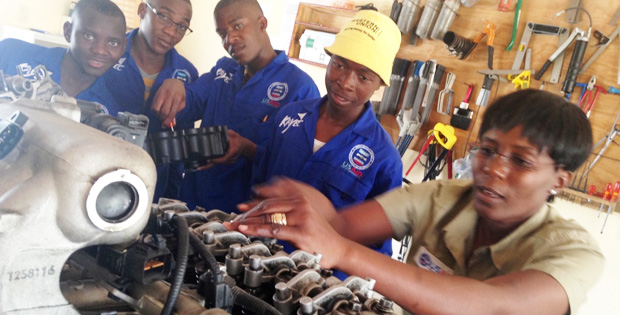
“This time is the last time,” said J.N.’s older cousin. When he visited the farm as a kid, the cousin would make him wire cars to play with … but now he was old enough to make his own. “I had to watch him and remember everything,” he recalls. J.N. “Pikkie” Shigwedha grew up in a mixed family of seven kids in Khomasdal. When J.N. was 16, his father passed away, and driving grew into an obsession. He begged his uncle to take him to underground races. “My Mom had a Corolla in the taxi rank. Sometimes I would drive it without the licence – with the taxi signs on and everything.” Where he was heading wasn’t clear: With 43 percent youth unemployment, J.N.’s generation faces no shortage of dead ends. Namibia’s government has taken strong action, paying for universal high school and starting Vocational Training Centres across the country, but youths like J.N. need additional answers to be able to turn their spinning wheels into healthy careers.
Because Namibia’s HIV response benefits from innovations that get youths off the streets and into steady work, the U.S. Agency for International Development (USAID) has leveraged funds from the President’s Emergency Program for AIDS Relief (PEPFAR) since 2006 to boost KAYEC’s skills training initiative. KAYEC understood that for Namibia’s out-of-school youths, state-run vocational courses were often unrealistic: Fees were high, and anyone without an airtight high-school record was shut out. By offering subsidised courses in high-demand trades, however, and eliminating entry requirements, it found thousands of young men and women who had been blocked from meaningful employment, but were eager to make good on their ambitions.
Shigwedha signed up for KAYEC’s small-engine course in 2011, and graduated at the top of his class. He quickly found work at a racing shop, and in 2014 he entered his first legal race, on the open desert outside Swakopmund, in a Golf he had converted himself. “The people underestimated me completely. I won my first race, won my second race, kept on winning.” He completed 12th grade, and in 2015 a South African college accepted him into its engineering programme. “KAYEC helped me when I applied,” he notes – and our HIV prevention curriculum still helps him avoid the epidemic. “Even now at college, we do testings. I had mine at the beginning of the year.” Since 2011, American support has allowed KAYEC to graduate 4,575 trainees like Shigwedha, and today the Namibian government is taking over the programme, as a blueprint for expanding state-run vocational schools for the youths who need them most. Shigwedha has set his eyes on further studies in the U.S.: “I’ll be the first one who can work on a Ferrari in Namibia. I’ll expect to open up a shop … help others who have this passion. Go big or go home!”

